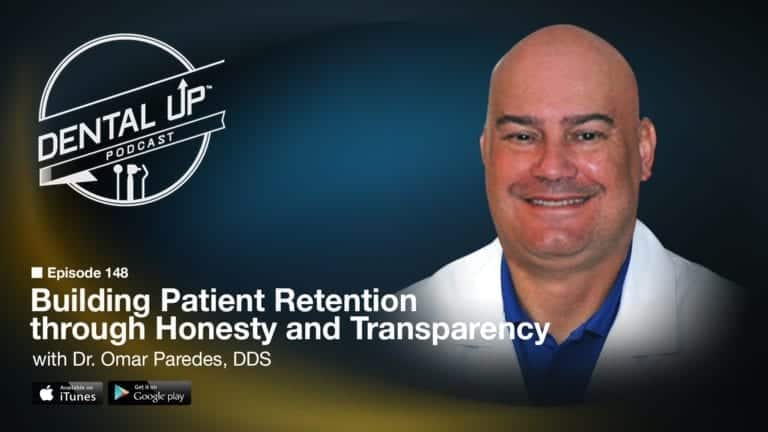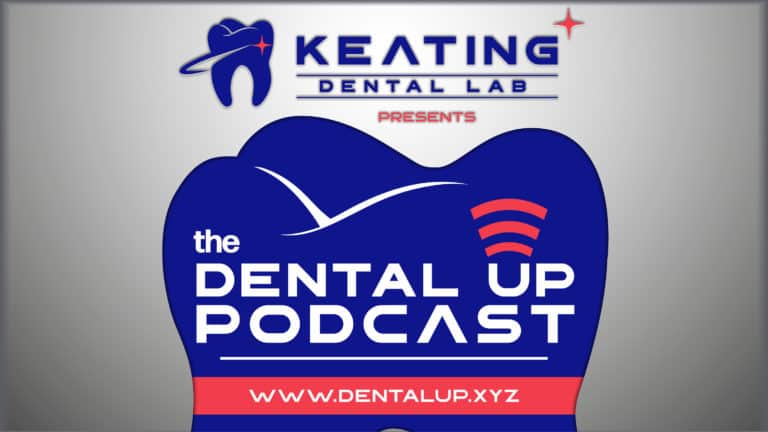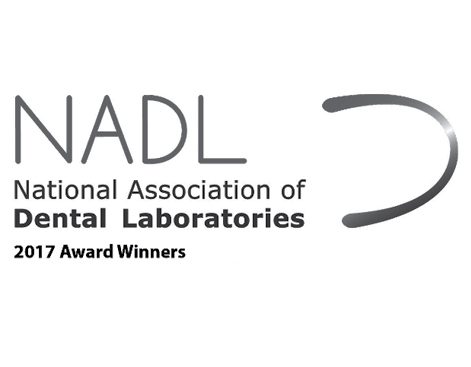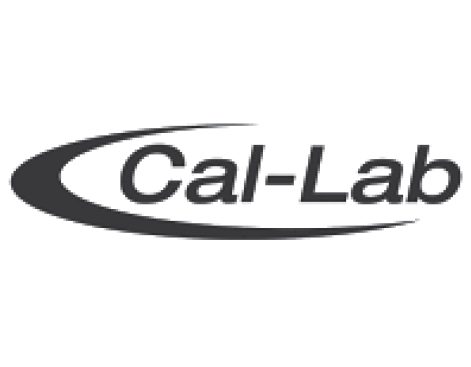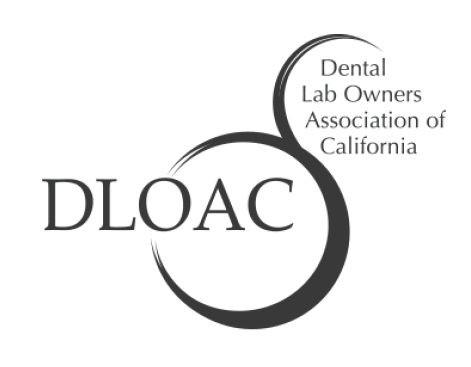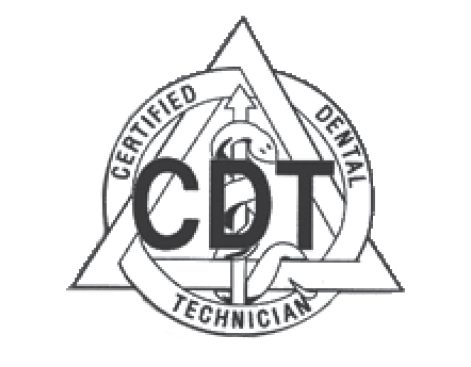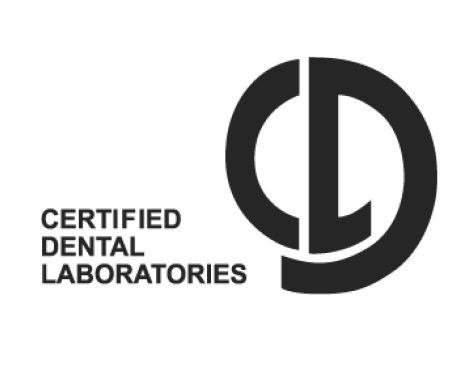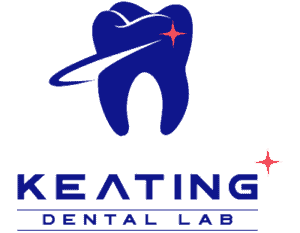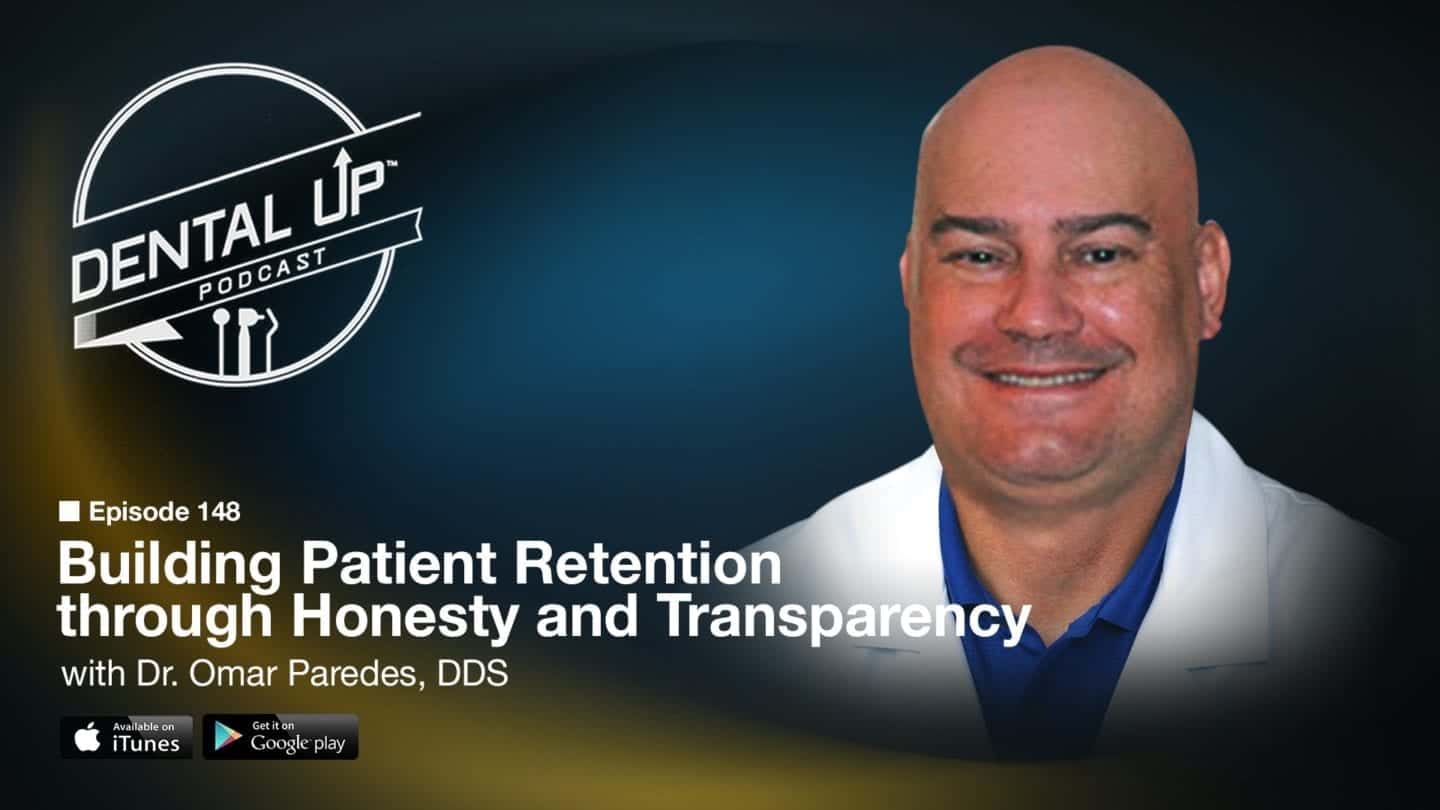
![]()
![]()
![]()
![]()
![]()
Our guest this week is Dr. Omar Paredes, DDS. We sat down with Dr. Paredes and chatted about the importance of being honest and transparent with your patients; and how doing so, helps your patient retention and your practice in the long run. We also get to know his story, his roots in Honduras and how he came to the United States.
In this episode Shaun and Dr. Paredes talk about:
-Why it’s important to focus on the quality of your product work.
-Why it’s important to look into your patients’ interest first and truly show them
the options they have.
-Why outsourcing certain projects, benefits you as a dentist and your practice.
-Finally, Dr. Paredes talks about why Honesty should be a key element in your day-to-day.
For more information on Dr. Paredes and his practice please visit
https://www.shenandoahdentalstudio.com
Check out their Facebook here: https://www.facebook.com/lexingtonvadentist/
[bg_collapse view=”link” expand_text=”View Full Transcript” collapse_text=”Hide Transcript” ]
Announcer: Ladies and Gentleman, this is the Dental Up Podcast brought to you by Keating Dental Lab a full service award winning dental laboratory. Each week you’ll learn tips and techniques from real world dentists bring you in depth interviews, motivating stories, current events, and sports. Here’s your host Shaun Keating.
Shaun Keating: Hey everyone, Shaun here. Welcome to another episode of the Dental Up Podcast. Our guest this week earned his Doctorate in Dental Surgery from the National Autonomous University of Honduras and received his post graduate training at the Louisiana State University Medial Center. He also helped write the curriculum and establish the East Carolina University School of Dentistry in Greenville, North Carolina. Currently practicing from Lexington, Virginia, please welcome Dr. Omar Paredes, DDS
How’s it going, Dr. Paredes?
Dr. Paredes: Thank you, Shaun. It’s going very well. Thank you for that introduction.
Shaun Keating: Oh man, thank you so much, dude, for coming onboard this podcast. We really appreciate it and can’t thank you enough because I know how busy you are. You’ve got a practice that’s booming, man. We thank you for all the work, too.
Hey, I always like to start off talking a little bit about sports and, man, what a game last night. Did you watch that Super Bowl at all or? It was a …
Dr. Paredes: Not at all.
Shaun Keating: Not at all.
Dr. Paredes: I don’t follow any sports. I’m boring in that sense. I don’t follow any sports.
Shaun Keating: Nah, you’re not boring, man. That’s okay. It was a boring game, man. It was horrible. It was like-
Dr. Paredes: That’s what my wife said. They watched the whole thing and she was quite upset, yeah.
Shaun Keating: It was crazy. It was like 3-0, man, for like the first half and then I think they almost tied it up 3-3. Then it went up to 3-10. Patriots winning the whole time. Then the Patriots got a field goal at the end so they won 13-3. Lowest scoring game ever in the Super Bowl and least amount of yards ever scored or done in rushing. Oh, what a nightmare of a game.
I mean the Rams were like one of the highest scoring teams in the NFL this year and it has just always been a shootout. Last one to get the ball is usually the one that wins ’cause everyone was scoring every series, but this was like a defensive real tough game. I mean I think we had like eight punts in a row that it was like three and out or very few first downs for the Rams.
The Rams were the youngest team out there. The couch is 33. The other couch of the other team is like 66. The New England Patriot’s quarterback, they call him the GOAT, the Greatest of All Time, he’s won more Super Bowls and everything else. He’s like 41, 42 and then our quarterback’s like 23, 24, or whatever.
They got schooled, you know? They got out coached. They got out played. The quarterbacks, yeah, what a difference between Brady and Goff. But, hey, I think it’s everything happens for a reason. It wasn’t the Rams time. I mean they’re a young team. I think we learned a lot, I think, going forward.
Plus also we have a new stadium being built. It’s not ready for the 2020 season. I got tickets for that season, so I don’t want them to win it all till I’m in that stadium and we’re there. I think we got a Super Bowl there at the LA Rams stadium in 2022 so if we can get there by 2022 I’ll be happy, man.
Dr. Paredes: Well, best of luck, guy. What can I say?
Shaun Keating: Oh. Well, thank you so much again for coming on. I think it’s time for us to dental up. Tell me why did you get into dentistry and at what point did you think, “I want to be a dentist.”
Dr. Paredes: I started as an electrical engineer, actually. I did about a year, year plus, of electrical engineer studies and I clearly remember sitting in a desk with a bunch of numbers and having this epiphany moment. I guess that’s what you call it, right?
Shaun Keating: Yes, you do.
Dr. Paredes: It was like, “Man, I can’t do this for a living. I’ll go crazy. I can’t do this for a living.” I come from a medical family. Everybody’s either a pharmacist or a prominent physician and I’m like, “Okay, I’ve seen their lives and I don’t kind a want to do that.”
I started doing some exploration in dentistry and the result was immediately shoot to the top of the charts. Everything came easy. Everything was really straightforward. I guess it’s the scientific mechanical abilities. That’s what drew me in and that’s what made me a dentist.
Shaun Keating: That’s awesome, man. Tell me a little bit. Where did you attend school? Tell me a little bit about your school journey, if you could?
Dr. Paredes: Well, I’m a graduate of the National Autonomous University of Honduras, the largest university in the country, and that location is a little bit different than what it is here in the US. You do five years of study. You get five years of studies and basically you finish your degree, but you don’t get your diploma.
You have to go and practice for I would say a health center, something set up by the Ministry of Health in the country. They’ll send you to the villages and everything, and you are the defacto dentist in there. At the same time you’re writing your monograph, your thesis, whatever topic you choose, and you’re the defacto dentist in that community.
At the end of the year you come back with your thesis, you go in front of this committee, and then you apply and you get your doctorate in dental surgery, so education is a little bit different. We do a lot of surgery. It’s battlefield dentistry.
Shaun Keating: No kidding.
Dr. Paredes: If you want to call it that. Very poor areas of the country. A lot of things are resolved surgically, a lot of retractions, a lot of impacted molars, cysts, and that sort of thing. Education is a little bit different in that sense, but that was my dental schooling.
From there on, went on and set up a practice. At the same time, I was fully involved in teaching activities and everything and managed to secure a position at the dental school. Eventually rose up through the ranks, became a professor with sorted dentistry, and had set up a private practice just focusing on cosmetic dentistry, static and cosmetic dentistry and rehabilitation practice. Been there for about I would say 1996 to 2003. At that time moved to the US.
Shaun Keating: You moved to Louisiana didn’t you or New Orleans?
Dr. Paredes: I moved to Louisiana, yes. I’m the last co-graduate from Charity Hospital.
Shaun Keating: No kidding.
Dr. Paredes: I completed a two year residency, GPR residency, in Charity Hospital. This was just prior to Katrina happening.
Shaun Keating: No kidding.
Dr. Paredes: I finished my residency, graduated, within a couple months Katrina hit and everything was a mess. By that time I was already in North Carolina.
Shaun Keating: Okay.
Dr. Paredes: Yeah, I’ve been a gypsy in a sort of way.
Shaun Keating: How’d you like that Louisiana food? That a little bit different than Honduras food?
Dr. Paredes: Well, I’ll tell you one thing. New Orleans in itself has the largest Honduran population outside of the country.
Shaun Keating: Oh, you’re kidding. No kidding.
Dr. Paredes: You can find pretty much anything, but I love Cajun food. I love that spicy food and everything, so I was like a fish in water down there.
Shaun Keating: Oh, perfect. Tell me about when you came to East Carolina University. What was that? Now, East Carolina what part of North … Is that part of North Carolina or South? There’s not a East Carolina, right?
Dr. Paredes: It’s just a geographic area, encompasses outer banks and what is called the inner banks in that area of North Carolina. I came there in 2005 and I took over a residency director position. The program was closing up for an accreditation. The previous director had left, didn’t want to deal with I guess with all the hassle of the accreditation. I was crazy enough to say, “You know what? I’ll take it and I’ll get it ahead.” That’s how I ended up in North Carolina.
Shaun Keating: No, kidding? When you started your practice, you’re in Lexington, Virginia, how did you get there? How did you come up with Lexington, Virginia?
Dr. Paredes: I don’t know why. Ever since I moved to the Us I was always like, “Okay, I was thinking of Virginia.” Don’t ask me why. Never been here. Didn’t know much about the place. I knew that was were Thomas Jefferson was from, Mount Vernon, this, the other, and George Washington, and the whole thing, but as far as being here, never, but I’ve always had that knack.
Seven years into the director in the residency program helping establish a dental school and everything, I started getting itchy. I guess a little bit of burnout on the academic side. It’s like, “Okay, I’ve always liked the patient contact.” I’m one of those guys that don’t tell me that you can do it. Show me you can do it.
Shaun Keating: There you go.
Dr. Paredes: As I was becoming more, I guess, more an academician I had less patient contact. I had to involve more myself in other things. That’s kind of where I started drifting away. I wanted to get that back. I guess I enjoyed the challenge of it, so I started looking around.
I looked at places in North Carolina. I wasn’t quite convinced of North Caroline. Started looking at Virginia. My initial bet was Charlottesville, Virginia. That’s where I wanted to be. I looked at some practices in Charlottesville, Virginia to purchase and nothing ended up kind of being what I envisioned for myself.
I had some friends working in a medical school here in Roanoke, Virginia and I get a call saying, “Hey, we here that you’re out and about.” We used to work together in North Carolina. We had done some research together and some things. They said, “You know, we have a fairly young school of medicine. We’ve done research in HIV grants and that sort of thing. Why don’t you come here, set up the dental like you had it set up down there. We’ll get out of your skin and you roll with it.”
And so, I drove to Charlottesville to Roanoke right in the middle is Lexington. I knew that I had been seeing a practice for myself for a couple of years. Me being typical me, I called on the phone, made an appointment, came to the practice, and I said “You know what? I’m really scared. I just want to see.” And I got a tour of the practice.
I saw it was a practice with good bones. It was a fairly new practice. The doctor had some family needs that he needed to address so he was leaving town. A couple years later I ended up purchasing the practice.
Shaun Keating: Beautiful.
Dr. Paredes: That’s how I ended up in Lexington, yeah.
Shaun Keating: No kidding?
Dr. Paredes: Yeah.
Shaun Keating: How far is that from Roanoke? I’ve been to Roanoke, man. That’s such a beautiful area there, man, just so green and it’s just like a whole different world out there.
Dr. Paredes: Yeah. Well, Lexington is about 45, 50 miles north of Roanoke. We are about the same distance west of Charlottesville. It’s a beautiful area. Anywhere you look out in this place it’s like you’re looking at a postcard. It’s beautiful.
Shaun Keating: Oh, it is. It’s so good.
Dr. Paredes: Great place for children. It’s a great community. I’m satisfied with the decision I made in that sense.
Shaun Keating: Have you ever been up to that homestead? It’s up a mountain up there somewhere.
Dr. Paredes: I’ve been at the homestead. Yeah, it’s about 40 minutes away from here. It’s beautiful.
Shaun Keating: A lot of history there, man. I think that was built in like the 1700s or something or 1800s. It’s so beautiful.
Dr. Paredes: Yeah, and they keep renovating it, but it’s a beautiful mountain hotel.
Shaun Keating: I went to a wedding there. My niece got married and, man, we stayed in one of the big whole floor suites. I think it was Thomas Jefferson’s or something. It was frickin’, it was so neat, man. They have their little lake, you know, that you can go fishing and then they have the pools. But, yeah, it took about an hour to get up that hill and it was storming hard I remember.
Dr. Paredes: Oh, yeah.
Shaun Keating: God, you don’t fly direct into Roanoke.
Dr. Paredes: It’s a beautiful place, though. Yeah, it’s a beautiful place, though.
Shaun Keating: Oh, it is. What a place to get married, for sure. Lots of memories.
Dr. Paredes: Yeah.
Shaun Keating: Tell me, describe a little bit of the layout of your practice. Tell me a little bit about that. How many ops you’ve got and maybe a little bit about your staff, if you could.
Dr. Paredes: I have five operatories. I Have two and a half hygienists, bordering on three, but two and a half hygienists, two front desk staff, two chair side assistants, one office manager, and I think that’s it. That’s eight, right? Seven or eight? Eight.
I have five operatories and we do mostly everything from extractions, surgical extractions, wisdom teeth to dental implants to CEREC restorations, [inaudible 00:13:43] rehabilitation. I’ve gotten my hands a little bit into everything in dentistry.
Shaun Keating: That’s awesome. How’d you get involved with CEREC, man, just way back in the day or you’re an earlier adopter or recently?
Dr. Paredes: I’ll tell you one thing. Being in academia gives you that advantage. You can try anything that’s out there. With the past generations of CEREC, I saw the evolution of things. I remember in dental school, when I was in dental school in the 80s, and it’s like, “Oh my goodness, they just made this machine that’s going to make crowns and the process takes like four hours. [inaudible 00:14:19]. Some day I know that that’ll pan out.” [inaudible 00:14:23] when evolving when they introduced the Omnicam. That’s when I took the job.
At that point I built my practice and I said, “Okay, I think that this does what I want it to do in the time frame that I want it and predictable enough.”
Shaun Keating: No kidding?
Dr. Paredes: One year I purchased the CEREK, the following year [inaudible 00:14:46] scan integration, and the rest is history.
Shaun Keating: That’s awesome. Do you have any associates working with you or you’re just the man, you got all them ops?
Dr. Paredes: No, I’m just myself.
Shaun Keating: Beautiful.
Dr. Paredes: Just myself.
Shaun Keating: What’s about like what’s your favorite procedure in dentistry? What’s your go to procedure that you love most, do you think?
Dr. Paredes: You know what? I’ve been thinking about that because I knew that that question was going to come around. I like a little bit over everything.
Shaun Keating: Okay. That’s a good answer.
Dr. Paredes: I like a little bit of everything. I guess I do enjoy the challenge.
Shaun Keating: There you go. Let’s flip it. What don’t you like doing? What is something that, “I’m going to send this off to the specialist or I just don’t want it. I wouldn’t even to it for my wife.”
Dr. Paredes: Typically, my patients request that I see their children. I do see children by patient request always with a caveat. First tantrum or anything, out of here.
Shaun Keating: Okay, there you go.
Dr. Paredes: I do refer children. It’s just I’m not adequately set up equipment wise and everything. I don’t have a quiet room. I’m more geared up to deal with adults. I do my own root canals. If I see a [inaudible 00:16:00] canal or any pre root canal, something that I haven’t done, something that is not my patient, somebody comes from another place and, “Can you retreat this?” “No, you’re going to a specialist.”
There’s that mechanic inside my head. How much time am I going to be tied in here versus how much time it should take me according to my head? Once that balance starts building up it’s usually, “You know what?” You’ve always got to look for the patient’s best interest.
Shaun Keating: Absolutely.
Dr. Paredes: If it’s something that you fear that there may be some complications and everything, I talk to the patients. I have an open relationship with them. I’m very transparent in everything. It’s like, “This is what I think. You could go to a specialist.” A lot of people still don’t want to go. Take it with a pinch of salt.
Shaun Keating: Absolutely, no.
Dr. Paredes: That’s what I tell people. I say, “Well, this is your choice. I would send you to a specialist.” I have a very good referral community nearby.
Shaun Keating: Yeah, I love … Someone told me a while back what they say is, when they refer something out the patient and they’re like hemming and hawing about it saying, “Oh, you could do it.” That’s when the doctor would say, “I wouldn’t even do it on my wife.” When they hear that it’s like, “Okay, I understand. You don’t do it.” I wouldn’t even do it for my wife and I’ll do anything for my wife, you know, type thing, but …
Dr. Paredes: Yeah.
Shaun Keating: Yeah, you almost gotta do that because I know the convenience for the patient, they want it done there and now, but sometimes you just step into a big hole you don’t want to. You want to be able to sleep at night, so I see. When to punt, man. You’ve got to know to punt, for sure.
Tell me a little bit about your marketing strategy? Do you do any social media? You do mailers? You’re working with the public sector. Tell me a little bit how you’re driving patients to your practice.
Dr. Paredes: We’ve done everything under the sun. We’ve tried postcard mailers. We’ve tried newspaper advertisement. We’ve tried this. We’ve tried the other. We’ve tried promos on our Facebook page and everything. Really my practice business driver is my own patient’s referrals. Referrals is my primary source of growth.
I tend to look at everything very critical and I still haven’t found one media that I say, “Oh my goodness, this is the substitution to Coke and, yes, this is the last thing that you’re going to have to do in advertisement and everything.”
Shaun Keating: There you go. That happened. I hear you.
Dr. Paredes: Yeah, it’s just a thing. I haven’t found anything, but, thanks be to God. the growth of my practice is do my patients.
Shaun Keating: Absolutely. And you know what doctor-
Dr. Paredes: They’re too kind to me.
Shaun Keating: 90% of the doctors out there, that’s their number one driver for patients to the practice is word of mouth through their own existing accounts that are happy, you know, your own patients and it’s free. It’s just something, take care of your patients and let them know that. You know what? Hey if it’s referral program or whatever, however you work it, just let them know we appreciate any referrals of your friends or family. We’d love to have those. It goes so far by asking. Taking care of your patients to begin with because you’ve got to keep them happy and treat them well.
But, man, that is just so on the money with most of the dental practices and I’ve done this a long time. It’s the same thing with me. 60, 70% of all my work I get in is from a doctor referral that will ask the dentist, “Hey, dude, can you refer us to any other dentist?” When they tell their friends or their peers that when we do try contact these dentists it just goes so far when it’s coming from a referral from a friend. It’s just the neatest thing, for sure.
Dr. Paredes: I think patients are your best advocates.
Shaun Keating: Absolutely. No, you’re so right there. What about on some of your education for your CE and stuff like that? Dental conventions, gatherings, are you going to any certain ones more than others? Tell me a little bit about what you do for your CE journey, if you could.
Dr. Paredes: Well, I’m a member of the CEREC Academy so typically I attend about 14, 15 hours of that yearly. Along with that I do about the same thing in whether it be the American Academy of [inaudible 00:20:25] Dentistry or Academy of Policy Integration. I’m a member of both. I attend some of that. The American Society of Dental Anesthesia, I’m also a member and I attend some of those courses. A little bit of everything. I like to keep my head busy.
Shaun Keating: Do you go to any of like the Chicago Midwinter, any of the bigger dental conventions at all?
Dr. Paredes: You know what? I’ve never done an ADA. I’ve never done a Midwinter. I’ve never done the Hinman. Never done any one of those. It’s just I just don’t do very particularly focused groups. It’s like I want to learn this and this is where I’m going or I want to go to this and this is where I’m going. It typically ends up like that for me.
Shaun Keating: Oh, that’s okay.
Dr. Paredes: But then, you know, you cram so many hours, like 60 plus hours in a year and it’s like, “Do I need to go another one? No, I can stay put.”
Shaun Keating: I love that. That’s just so [inaudible 00:21:20].
Dr. Paredes: There’s a moment where money and gain, you’re just like, “Okay, am I really going to gain a lot of knowledge from going to this? No. It’s probably just a social event.”
Shaun Keating: That’s what I’ve found them to be a lot of times. I’ve done that dog and pony show for probably 20 years and the last several years I’m like, “You know what? I can go eat dinner anywhere I want around home.” I used to get excited to go to Chigo here and there. I still do Chicago because I just love that city and it’s a big thing for me for laboratory. They have a lab day. It’s really big. It’s important for me to go to that.
But I get in and I fly out. I fly out early Saturday morning, man. I mean we’ve got Chicago coming up, man, and it’s like 20 below. It’s just miserable weather. It’s always been that way every year. The Yankees right now, I just went over the last weekend, and it’s like, “Dang.” Yeah, so we’re getting ready to go to Chicago and it’s like, “Good lord,” but I got CE that I need to get for my certification each year and so you’ve got to do it.
Dr. Paredes: I hear you. We’ve got to stay on top of those things.
Shaun Keating: God knows I can’t take that test again, man. I haven’t been on the bench in years so I’ve got to keep my certification up.
Dr. Paredes: I hear ya, but anyway.
Shaun Keating: Oh, that’s so funny.
Well, dude, tell me a little bit on your thoughts on some of those new technology like impression scanners. Are you thinking about getting into any of them or have you looked into any of them?
Dr. Paredes: Well, I do have a CEREK , a CEREK Omniscan.
Shaun Keating: Oh, yes.
Dr. Paredes: That can scan most of the work I’m sending to you guys to, let’s say, fix. When there’s a long scan bridge or something that I need to scan, mouth guards, [inaudible 00:22:56] guards, those appliances, I just use my CEREK and I’ll send it electronically to you guys.
Shaun Keating: I know, man. We love it. We love it, baby. It’s awesome.
Dr. Paredes: It facilitates everything, you know?
Shaun Keating: Yeah.
Dr. Paredes: It does facilitate everything for me.
Shaun Keating: It really does.
Dr. Paredes: I spend less dealing with things, less time mixing plaster and vacuuming plaster, and this and the other. We just do just like a direct scan, send the file, and get your things back in a few days.
Shaun Keating: It’s just amazing. It’s so frickin’ accurate, too. It’s just the neatest thing. I remember when that CEREC first came out back in the day I was worried. I have a lot of doctors that do the CEREC and it stunk. I worried about it at first, but I’m still getting all their other work. I’m getting the bigger bridges. I’m getting a lot of the implant stuff. I’m getting a lot of the stuff that have to be done in a PFM where we might have to do soldering in places, stuff like that.
But my CEREC doctors and my digital doctors are some of the best that we have because it makes your practice so much more accurate. It’s such a high magnification when you’re looking at these preps. You can’t go to the next module unless that is clear at that margin. And the height of the preps, it’s just pretty amazing. It’s just such a neat thing.
Like you were saying earlier, you had it when they came out with the Omnicam. Some guys had a vision of it, you know? I didn’t have that vision. I thought it would be a fly by night product, but it’s here to stay and it’s evolving. I think other companies have stepped up, too, like got into the CEREC world in a way in their own systems.
I think as the prices go down and everything else I think it’ll become mainstream, but good labs are going to have to set their self apart with service and other products that can’t be done chairside direct. We love those indirects. I know you can do a lot of stuff direct, man, but we love the indirects. All our veneers and all our implants and stuff like that, man, that’s just pretty amazing.
Now, on your implants, have you ever sunk your implants? Are you kind a sending those on, just restoring them? Tell me a little bit about your implants?
Dr. Paredes: It all depends. Most of my implants I restore [inaudible 00:25:15] with my CEREC. I sent some cases to you guys and just when I say, “You know what? This would benefit more from a PFM type restoration or from a [inaudible 00:25:27].” There’s applications for everything.
Shaun Keating: Absolutely.
Dr. Paredes: In dentistry there’s no magic bullet.
Shaun Keating: Yes, you’re right.
Dr. Paredes: Many of times we get under the impression it’s like, “Oh my goodness, I have this thing and it’s going to do everything.” No, it’s not going to do everything. You either become really good at one thing or kind of okay at everything.
Shaun Keating: Exactly.
Dr. Paredes: That’s the thing. You need to look for excellence in a product. We need to deliver the best. In that sense, everything has got its applications. It’s like, “Okay, yes, this needs a human hand, somebody dealing with this.” Somebody casting a frame or somebody casting a gold crown. Somebody doing this, somebody doing the other. Now, we can use the technology to get you the information efficiently, but there’s a little bit of everything.
Shaun Keating: Absolutely.
Dr. Paredes: I always say that.
Shaun Keating: Well, that’s a good attitude. You have to say that. It’s like, “Everything’s a square or E=everything’s a circle.” It’s not. I mean every case, ever patients, different. You gotta just, you know? There’s not one procedure that fits all. It’s just you’ve got to have such an open mind to be able to do the right thing.
You have to do what’s best and not just what you got in your office. Like, “Hey, I’m going to make a CEREC on everything in here.” No. That’s not what dentists do. I know they use it for restorations they can do, maybe some inlays or onlays or maybe some single crown, stuff like that. It’s neat when a doctor does know the limits of what materials are good for these patients and what aren’t. That’s pretty awesome.
What advice can you give some of our newer dentists just starting off, some of the does and don’ts?
Dr. Paredes: Just one very basic thing. Treat people, not teeth.
Shaun Keating: There you go. That’s a good one.
Dr. Paredes: I mean it’s part of going to dental school. You get into this mindset, “Oh my goodness, I need to complete so many root canals or I need to complete so may extractions or I need to complete so many crowns or class one fillings or this or the other.” You know what I mean.
Shaun Keating: Yeah, exactly.
Dr. Paredes: Then you end up getting that tunnel view. It’s like everything revolves around that tooth. Many a time what I see of the people that come to me is, yeah, they’ve had very good dentistry, but they treated the tooth. They didn’t treat the person.
Shaun Keating: There you go.
Dr. Paredes: Many a time people come to me and they say, “Can you give me an opinion on this?” or “I’m dissatisfied with this.” And it’s like, “You know what? You’re [inaudible 00:28:02] is perfectly good, but it’s treat the person.”
Shaun Keating: Treat them right. Show them what they’re options are, what you recommend, treat them well, and good things will happen, man, for sure.
Dr. Paredes: The other thing is nobody’s a perfect match for everybody. That’s also another thing that I tell people that come to me for a first time opinion. I say, “You know what? I may not be the right match for you.
Shaun Keating: There you go.
Dr. Paredes: You know? But I think honest has got to be at the core of whatever we do.”
Shaun Keating: Words of wisdom, baby. That’s awesome.
How’s my lab doing for you? We doing all right? We dropping the ball?
Dr. Paredes: You guys are doing great.
Shaun Keating: That’s awesome.
Dr. Paredes: You guys are doing great.
Shaun Keating: Oh, thank you. How’d you here about my lab, do you remember at all?
Dr. Paredes: Actually, you know what? When I was in LSU.
Shaun Keating: Oh, you’re kidding. Oh. That was probably …
Dr. Paredes: When I was way back when.
Shaun Keating: No kidding.
Dr. Paredes: Even when I practiced back home, I was always coming to the US. There’s this new revelation in aesthetic dentistry. Okay, here comes the meeting and everything. I would see your … You know, at the dental meeting.
Shaun Keating: Okay.
Dr. Paredes: I would see your brochures. I would talk to your guys. I think you and I crossed paths more than once at a meeting and shook hands.
Shaun Keating: I think so.
Dr. Paredes: It was just one of those things.
Shaun Keating: Oh, that’s so cool, man.
Dr. Paredes: You know, I guess you go making imprints.
Shaun Keating: Yeah. Oh yeah, that’s-
Dr. Paredes: That’s how eventually, you know?
Shaun Keating: Yeah. I think we have a big fan out there in LSU, too, Dr. Jerome Smith, Jerry Smith. He’s a big implant guy. I love him, man. I’ve done his work for a long time. He’s a wizard, man.
But it’s just such a small world in the dental field and it’s just neat. We all work together. We all kind a work for these patients, man. We try to do our best job. It’s just a neat thing when you get guys passionate about it like yourself.
Man, I just can’t thank you enough for all work that you send us, but just all the great work and just your great attitude. I can’t thank you enough for coming up on the Dental Up Podcast, man. It was a good one, baby.
Dr. Paredes: Well, thank you for the opportunity, man. Happy to do. Happy to do.
Shaun Keating: Well, you got it, man. You so much. Again, if there’s anything you need me to do please let me know. But again, thanks for coming on. We’ll talk to again real soon.
Dr. Paredes: Okay, partner. God bless you all and take good care of you.
Shaun Keating: God bless you. We’ll talk to you soon. Thanks again, Doctor.
Dr. Paredes: Okay. Bye bye.
Shaun Keating: All right. Bye bye.
Announcer: Thanks for joining us on the Dental Up Podcast show this week. Make sure to follow us on Facebook, Instagram, and Twitter or search the Dental Up Podcast on iTunes for our weekly feed.
Don’t forget to visit keatingdentallab.com/promo for exclusive offers. Keating Dental Lab is a full service dental laboratory and we’re nationwide. We’d love for you to send us a case so we can show you the Keating difference.
If you dig what you heard, please leave a review on iTunes and we’ll be back next week.
[/bg_collapse]

